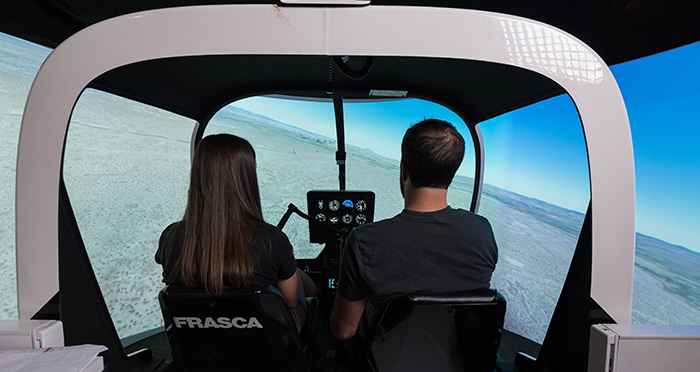(Photo above: Aviation simulator | photo by Aimee Metcalf)
The airline industry is in the midst of an unprecedented pilot shortage which has resulted in higher enrollment numbers for the Aviation Program at Central Oregon Community College (COCC). This crisis is the result of a combination of large scale retirements and an insufficient numbers of military pilots. Additionally, Federal Aviation Administration (FAA) regulations increasing the minimum flight hour requirements for airline employment has caused longer timelines for creating new pilots.
COCC’s Aviation Program is helping fill the need for well-trained pilots by offering several degree programs.
“Student enrollment has been positively affected by industry demand,” said Karl Baldessari, aviation program coordinator and helicopter instructor at COCC. “Regional airlines like Horizon and Sky West have created bridge programs that provide our students access to entry level airline jobs well ahead of historic schedules.”
COCC’s aviation program offers a number of degree programs including the associate of science degree program, unmanned aerial systems (UAS) degree program, airplane degree program and helicopter degree program.
The UAS degree program is the newest drone program offered by the school. Students are trained to work as professional UAS pilots in the industry of aerial robotics or drones.
“The drone industry continues to evolve through expanded FAA regulations,” said Baldessari. “The operating envelope of drones has been broadened to include flight out of line-of-sight for certain sectors of the industry. Emphasis on supporting skill sets like Geographic Information Systems (GIS) is equally important as drone operation skills. The COCC degree adapted accordingly by including a GIS certificate within its drone degree.”
COCC provides state of the art simulator training and support where students learn to operate and maintain UAS platforms including unmanned aerial vehicles (UAV), ground control stations and ground support equipment.
With approximately 200 students and 44 staff the student/teacher ratio keeps class sizes small and engagement high. COCC’s aviation program employs two full-time faculty, six part-time faculty, an administrator and approximately 35 certified flight instructors.
“The program has been fairly stable at approximately 200 student, but we are beginning to see a slight uptick as a result of the airline pilot demand,” Baldessari said. “If the pilot shortage scenario plays out over five-ten years as is expected, it would be logical to assume a continued increase in enrollment.”
Part of COCC’s curriculum growth includes a new option for students to interview with Horizon Airlines and gain acceptance to their pilot progression program. The program includes mentoring, financial assistance and a guaranteed job upon reaching airline transport pilot minimum qualifications.
The pilot progression program has incorporated two new state-of-the-art simulators in an effort to enhance student training and introduce an opportunity for reduced cost.
As part of COCC’s continued efforts to get better engagement and fill careers in the aviation industry they have a partnership with Sisters High School flight science program and recently donated an older plane simulator to the school.
“A relationship between COCC and Sisters High School could create the ultimate pipeline from cradle to airline cockpit,” Baldessari said.
With new programs, connections to local schools and career paths in aviation ready for the taking COCC is prepared to supply the industry with its next generation of aviation professionals.
COCC Aviation
Location: 2600 NW College Way, Bend, OR., 97703
Website: www.cocc.edu/aviation
Contact: 541-318-3736
Aviation Program Coordinator: Karl Baldessari
No. Employees: 44
Year Established: 2006
Product/Service: Aviation education.
Hot News: Student enrollment has been positively impacted by aviation industry demands.



